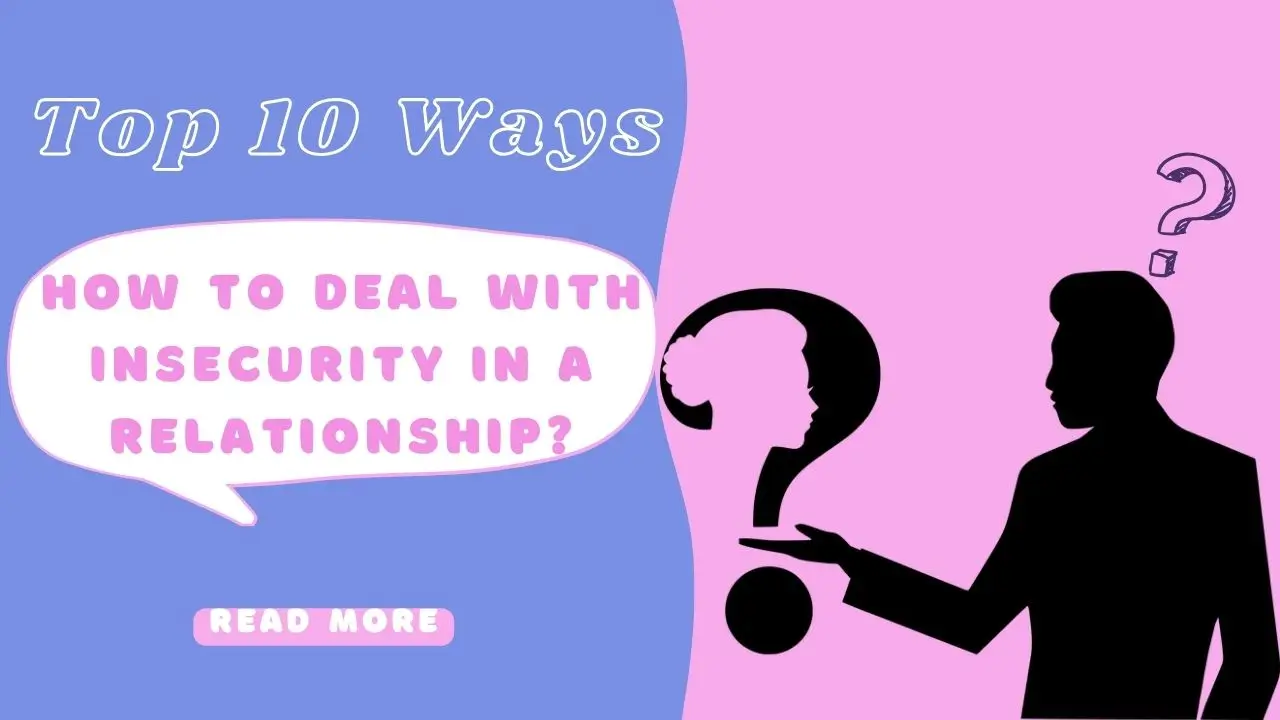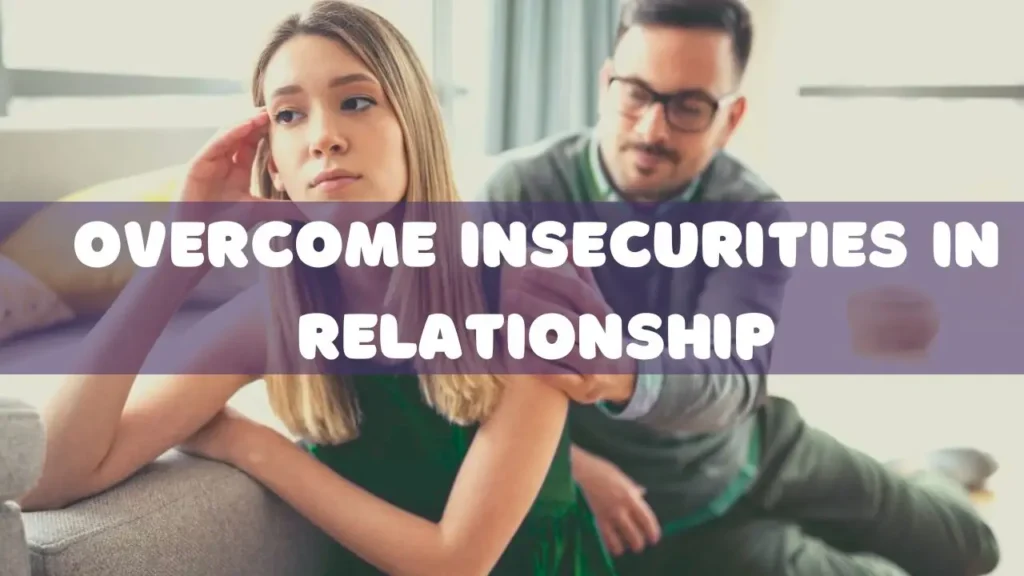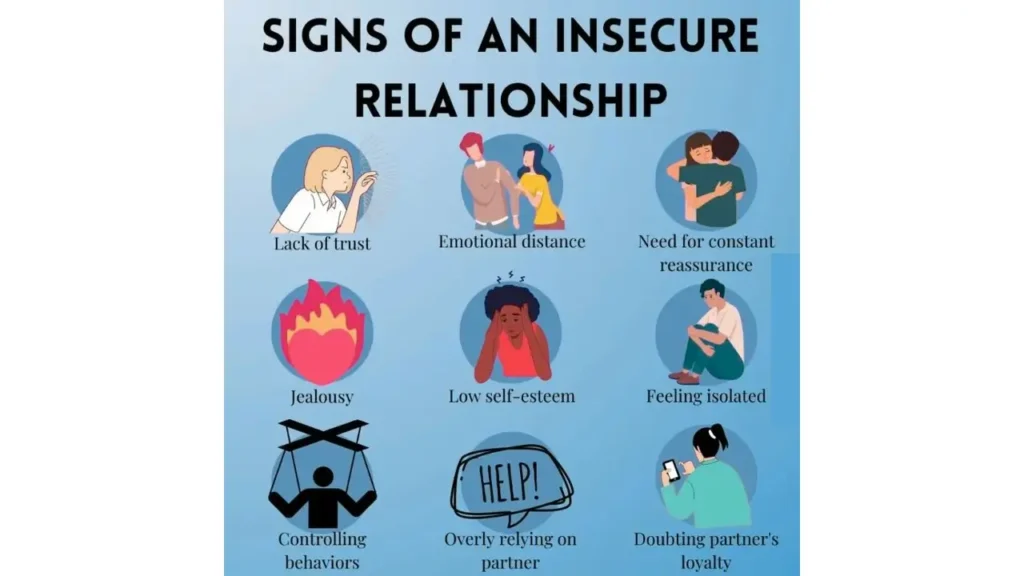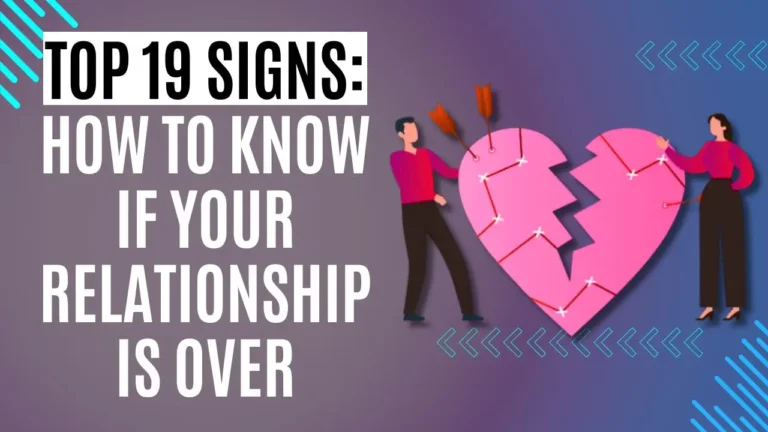Top 10 Ways: How to deal with insecurity in a relationship? 2024

How to deal with insecurity in a relationship? Insecurity is a feeling of uncertainty, doubt, or fear that arises from a lack of confidence or trust in oneself or others. It can affect anyone, regardless of age, gender, or background, and it can manifest in different ways, such as jealousy, anxiety, clinginess, or low self-esteem.
Insecurity can also hurt your relationship, as it can cause you to question your partner’s feelings, actions, or intentions or act in controlling, defensive, or needy ways.
Insecurity in a relationship can stem from various factors, such as past experiences, personal insecurities, unrealistic expectations, or external influences.
Don’t forget to learn more about Treatment Of Delusion
However, it is not a permanent or hopeless condition, and it can be overcome with effort, patience, and support. This blog post will explore ways to deal with insecurity in a relationship and how to find security and happiness with your partner.
Top 10 Ways : How to deal with insecurity in a relationship?
1- Open communication
One of the most important steps to address insecurity in a relationship is to have open and honest communication with your partner. Communication is the key to understanding, resolving, and preventing conflicts, misunderstandings, and assumptions that can aggravate insecurity.
By expressing your feelings, needs, and concerns, you can establish trust, intimacy, and respect with your partner and demonstrate that you care about their point of view and well-being.
You can Also Read About Role Of Media In Shaping Masculinity
To communicate effectively, it is important to use “I” statements, such as “I feel insecure when you don’t text me back,” instead of making accusatory or blaming statements, such as “You always ignore me.”
Also, it is essential to actively and empathetically listen to your partner without interrupting, judging, or dismissing them. It is also wise to avoid making assumptions or jumping to conclusions and instead ask questions or clarify unclear or confusing things.
2- Establish boundaries
Setting and respecting boundaries is a helpful way to deal with relationship insecurity. Boundaries are the limits or rules you and your partner set for what is acceptable or unacceptable in your relationship.
You can set boundaries for different aspects such as personal space, privacy, time, social media, friends, family, hobbies, or work. Boundaries can protect your relationship from external pressures and help maintain your individuality and autonomy.
Don’t forget to read more about What Is Female Delusion?
To establish boundaries:
3- Work on building trust.
Trust is a vital element of any robust and secure relationship. It is the belief that your partner is dependable, truthful, devoted, and loyal and that they have your best interests at heart. Trust is also the ability to rely on your partner, to share your thoughts and feelings with them, and to support and comfort them.
Trust can alleviate insecurity, making you feel more assured, secure, and valued in your relationship. To build confidence in your relationship:
Here is the complete guide on How To Build Trust In Your Relationship
Please don’t take them for granted or neglect them.
4- Self-reflection
Self-reflection is analyzing and comprehending your thoughts, emotions, and actions and their impact on yourself and others. Engaging in self-reflection can assist you in coping with insecurity in a relationship, as it enables you to identify and resolve the underlying causes of your insecurity, such as past traumas, personal insecurities, or unrealistic expectations. Additionally, self-reflection can aid you in recognizing and modifying any harmful patterns or habits that you may have, such as being overly reliant, controlling, or defensive.
You can also read about Effects Of Male Delusion
5- Build self-esteem
Self-esteem refers to how much you respect and appreciate yourself. It can affect your thoughts, emotions, actions, and relationships. High self-esteem makes you more likely to feel worthy and capable of love and happiness. Your self-esteem can also influence how secure you feel in a relationship and how you handle challenges.

6- Provide emotional support
Emotional support is showing care, compassion, and empathy to someone going through a difficult or stressful situation. Emotional support can help you and your partner deal with insecurity in a relationship, as it can help you feel more understood, validated, and comforted and cope better with your emotions and challenges. Emotional support can also strengthen your bond, intimacy, and trust with your partner and show them that you are there for them and that they are not alone.
You can also read about The Hidden Struggle With Toxic Masculinity
7-How to deal with insecurity in a relationship: Seek reassurance positively
Reassurance means helping someone feel less doubtful, anxious, or afraid. Reassurance can help manage insecurity in a relationship. It can make you feel more confident and secure and help you overcome your worries. Reassurance can also show your partner that you trust and value them and appreciate their efforts and support.
However, seeking reassurance too often or negatively can be harmful, for example, if you keep asking your partner to prove their love, loyalty, or honesty, accusing them of cheating, lying, or hiding something, or if you demand that they change their behavior, appearance, or personality. These behaviors can lack trust, respect, or confidence, harming your relationship and your partner’s self-esteem.
8- Manage your expectations
Expectations are your hopes or beliefs about yourself, your partner, or your relationship. They determine what you think will happen or how things will or should be.
Your expectations can significantly impact your relationship satisfaction, happiness, and sense of security. They can influence how you evaluate, judge, or react to your reality.
Don’t forget to learn more about What Is Man Delusion?
You will likely feel more secure if you have realistic and positive expectations. Such expectations make you more accepting, flexible, adaptable, and less likely to feel disappointed, frustrated, or resentful.
9- Stop Playing The Blame Game
Playing the blame game means accusing or criticizing someone else for something that went wrong or that you are unhappy or insecure about. It can harm your relationship, creating conflict, resentment, and distrust. It can also prevent you from taking responsibility, learning, or improving yourself. Playing the blame game can indicate insecurity, showing that you are trying to avoid or deflect your faults, fears, or failures or trying to control or manipulate your partner.
Don’t forget to learn more about What Are The Stages Of Delusion?
10- How to deal with insecurity in a relationship: Avoid Unnecessary Comparisons
Comparisons involve:
Comparisons tend to affect one’s level of insecurity in a relationship, as they can make an individual feel inferior, inadequate, or dissatisfied. They can also make one more envious, jealous, or resentful. Moreover, comparisons can distort one’s perception of reality, as they may cause an individual to overlook or exaggerate the differences or similarities, as well as the advantages or disadvantages, between oneself and others.
What are the signs of insecurity in a relationship?
Insecurity in a relationship can manifest in various ways. Some signs to watch out for include:

What Causes Insecurity in a Relationship?
Insecurity can arise in a relationship due to various reasons, some of which are:
Don’t forget to learn more about Understanding Delusion And Blunder 4umi With Example
Find Security in Your Relationship with Talk space
If you’re struggling with insecurity in your relationship and need professional help, Talk space offers online therapy with licensed and experienced therapists. The platform provides convenient, affordable, and confidential counseling to help you achieve the following goals:
- Understand and address the root causes of your insecurity, such as past experiences, personal insecurities, unrealistic expectations, or external influences.
- Identify and change any unhealthy or harmful patterns or habits that you may have, such as being overly dependent, controlling, or defensive.
- Learn and practice new skills and strategies to cope with your insecurity, such as communication, trust, self-esteem, or boundary setting.
- Improve your relationship with your partner by enhancing communication, trust, intimacy, and respect.
- Boost your self-esteem, confidence, and worth by recognizing and celebrating your strengths, achievements, and qualities.
Impact of Insecurity on Relationships
Insecurity in a relationship can have several negative effects, such as:
- It may reduce your self-esteem, confidence, and worth, leaving you feeling inferior, inadequate, or unsatisfied with yourself, your partner, or your relationship.
- It can increase your stress, anxiety, or depression, as well as make you feel more scared, concerned, or sad about yourself, your spouse, or your relationship.
- It can destroy your trust, closeness, and respect for your relationship, leaving you feeling more distant, disconnected, or separated from them.
- It can lead to tension, jealousy, and distrust in your relationship, making you more likely to argue, fight, or break up with your spouse.
- It can impact your personal, social, and professional life, making you more distracted, unproductive, or separated from your friends and family.
FAQs About how do I deal with insecurity in a relationship
How do you overcome insecurity in a relationship?
If you want to deal with your insecurity in a relationship, it’s essential to identify the root causes and take steps to build trust and confidence in yourself and your partner. Here are some strategies that you can use to overcome insecurity:
Communicate honestly and openly with your partner about your feelings and needs.
If you have unresolved trauma or emotional issues that affect your self-esteem, seek professional help.
To nurture your well-being and happiness, practice self-care and self-compassion.
Challenge negative thoughts and beliefs that fuel your insecurity.
Can a relationship survive insecurity?
If you’re in a relationship and feeling insecure, working through it together and supporting each other is possible. But if you don’t address your insecurities, they could damage your relationship and lead to conflicts, mistrust, and resentment. That’s why it’s important to tackle your insecurities as soon as possible and seek help from a professional.
How do you stop being insecure in a relationship as a woman?
Certain challenges may make you feel insecure in a relationship if you’re a woman. These could include social pressure, gender stereotypes, or unrealistic expectations. Valuing yourself as a person and a partner is important to stop feeling insecure. Embracing your identity can help you achieve this.
How do I become more secure in a relationship?
To feel more secure in your relationship, it is important to cultivate a secure attachment style. Feelings of trust, intimacy, and comfort characterize this style. With a secure attachment style, you are more likely to feel confident and relaxed in your relationship and better equipped to handle any challenges or conflicts.
How can insecurities ruin a relationship?
Insecurities can hurt a relationship if they are not addressed and resolved. Insecurities can lead you to:
Doubt your partner’s love and commitment, and make false accusations of cheating or lying.
Feel jealous and threatened by your partner’s friends, family, or coworkers.
Demand constant reassurance and validation from your partner while ignoring their feedback.
Isolate yourself from your social circle and hobbies, and depend on your partner for happiness.
Recognizing and addressing your insecurities is important to maintain a healthy and happy relationship.
Final Words About How to deal with insecurity in a relationship
In conclusion, experiencing insecurity in a relationship can negatively affect both partners and the relationship itself. However, there are ways to overcome insecurity and build a healthy and secure bond with your partner.
Some strategies include open communication, setting clear boundaries, building trust, engaging in self-reflection, boosting self-esteem, providing emotional support, seeking positive reassurance, managing expectations, avoiding playing the blame game, and refraining from making unnecessary comparisons. Following these tips, you can find security in your relationship and enjoy a happier and more fulfilling love life.







2 Comments